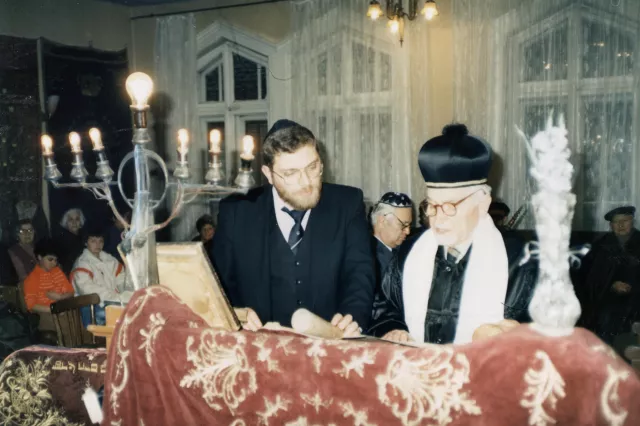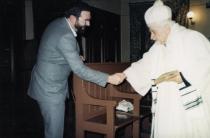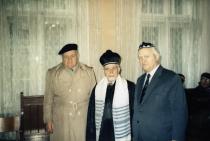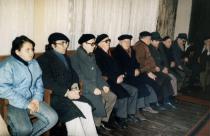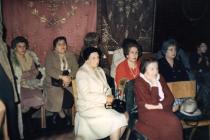This is a photo of haribi [rabbi] Haim Meshulam, to the right, and Maxim Kohen. As far as I understand they are reading the Megillat Ester for the Purim holiday. Megillat is the scroll of Ester. I can be seen in the background (between them). The picture was taken at the Sofia synagogue in the 1990s. During this holiday, while reading the Megillat when the name of Haman is mentioned, the would-be exterminator of all Jews, everyone patters with his legs. Rattles are also used for that purpose.
Haim Meshulam used to be the rabbi at that time. He was born in Plovdiv and his father was from Odrin, and was a rabbi also. He remained in Bulgaria and was a rabbi in the synagogue at the end of the 1940s. He was also a mohel. He traveled around in different towns in order to do the job. At that time rabbis had the right to perform weddings, and so he did that too. He became a rabbi in 1986 and people respected and honored him very much.
At the beginning of the 1980s Maxim Kohen was sent by the Jewish community to Budapest, where there was a yeshivah. [Editor’s note: The last yeshivah in Hungary closed in 1956. It was the famous Rabbinical Seminary of Budapest that didn’t close even during communism.] He studied there for six months. As the Budapest yeshivah was an Ashkenazi one, he stayed for six months more in Bucharest, where there was a Sephardi one. He had some practice there helping the rabbi in reading the prayers. Maxim Kohen went to New York in 1990 in order to study in a yeshivah for two years. However, later on he retreated from the synagogue.
In totalitarian times people visiting the synagogue were treated as suspicious characters. If an official of Jewish origin was spotted visiting the synagogue, he became a subject of persecution. There wasn't a law forbidding visits to the synagogue, on the contrary, the state financially supported the synagogue. Yet, it was forbidden for children, young people and citizens here. All religions were treated in that way, and this didn't only happen to us. Religion was considered something bad which had to be abolished. There is also another thing: as a whole, the Bulgarian people aren't fanatics concerning religious matters, unlike the Catholics, for example. This could also be one of the reasons that in Bulgaria there weren't large manifestations of anti-Semitism.
